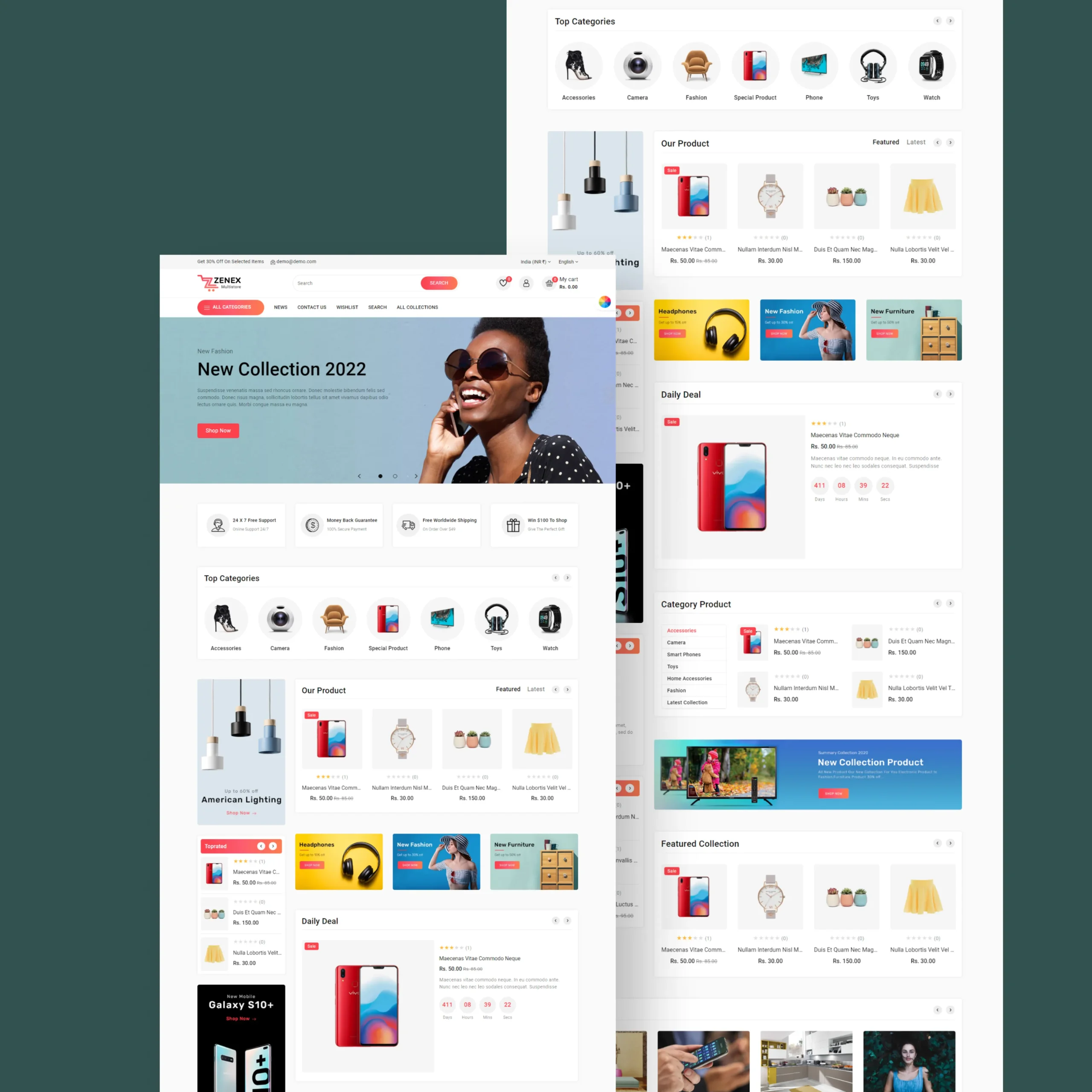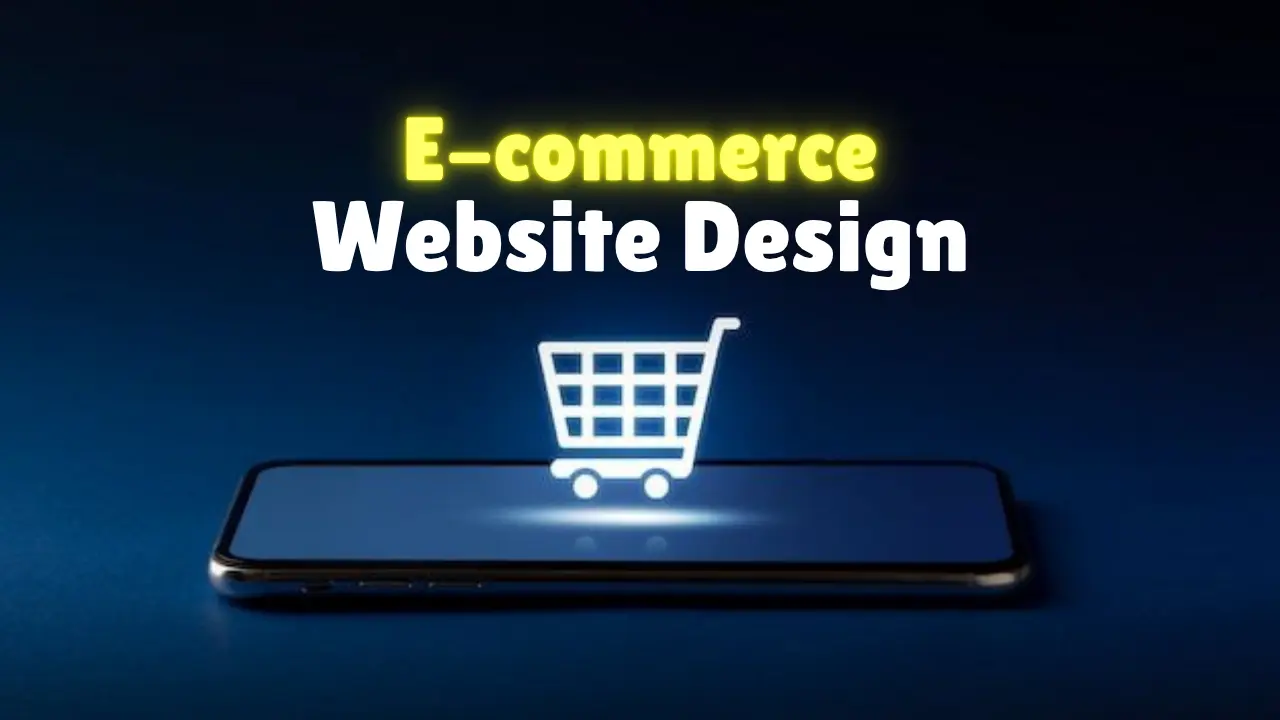The Ultimate Guide to E-commerce Website Design for Businesses in Kenya and East Africa
It is now imperative to have a strong online presence; it is no longer optional. E-commerce website design has emerged as a critical success factor for businesses in Kenya and throughout East Africa.
Your website is frequently the initial point of contact with potential clients, regardless of whether you're providing technology, fashion products or expert services.
In addition to drawing visitors, a well-designed e-commerce website turns them into devoted customers. Let's take you through every step of creating a successful e-commerce website that is suited to the particular requirements of Kenyan businesses as well as those in the larger East African market.
Why E-commerce Website Design Matters
E-commerce is transforming how businesses operate in Kenya and East Africa. With a growing tech-savvy population and widespread mobile adoption, more people are turning to online shopping for convenience and variety.
However, simply having an online store isn’t enough. Your e-commerce website design plays a critical role in determining whether visitors stay, browse and make a purchase or leave frustrated.
A poorly designed website can drive potential customers away, while a sleek, user-friendly platform can build trust and encourage repeat business.
For example, if your site takes too long to load or isn’t optimized for mobile devices, you risk losing a significant portion of your audience. On the other hand, a well-structured e-commerce website with intuitive navigation, secure payment options and engaging visuals will keep users hooked. This is where partnering with experts like Explosify can make all the difference, ensuring your site is both functional and visually appealing.
Key Elements of an Effective E-commerce Website Design

When designing an e-commerce website, certain elements must be prioritized to create a seamless shopping experience. These components not only enhance usability but also contribute to higher conversion rates:
- Mobile Optimization
With over 90% of e-commerce transactions in Kenya being conducted via mobile devices, optimizing your website for mobile is non-negotiable. A responsive design ensures that your site looks and functions perfectly on any screen size, from smartphones to tablets. Without mobile optimization, you risk alienating a large segment of your audience.
- User-Friendly Navigation
A cluttered or confusing layout can frustrate users and lead to high bounce rates. To prevent this organize your products into clear categories and subcategories. Include a search bar with autocomplete functionality so customers can quickly find what they’re looking for. Simple menus and breadcrumbs also help users navigate effortlessly.
- Fast Loading Speeds
Speed matters especially in regions where internet connectivity may vary. If your website takes too long to load, visitors are likely to abandon it. Compress images, minimize code and leverage caching techniques to ensure your site loads quickly, even on slower connections.
- Secure Payment Gateways
Trust is crucial in e-commerce. Integrating trusted payment gateways like M-Pesa, PayPal and Stripe reassures customers that their financial information is safe. Additionally, displaying security badges and SSL certificates boosts credibility.
- Engaging Visuals
High-quality images and videos showcase your products effectively. Use zoom-in features for detailed views and include lifestyle shots to give context to how items can be used. Avoid generic stock photos; instead, invest in professional photography that reflects your brand identity.
Types of E-commerce Websites and Their Applications
Not all e-commerce websites are created equal. Depending on your business model, you’ll need a design that aligns with your goals and target audience. Here are the most common types:
- B2C (Business-to-Consumer): Ideal for retailers selling directly to individual customers. Examples include Jumia and Kilimall.
- B2B (Business-to-Business): Designed for companies trading goods or services with other businesses. Think wholesale suppliers or distributors.
- C2C (Consumer-to-Consumer): Platforms like OLX and Pigiame allow individuals to buy and sell products to one another.
- C2B (Consumer-to-Business): Freelancers and service providers use these sites to offer their expertise to businesses.
Each type requires a unique approach to design. For instance, a B2C site might focus on flashy visuals and discounts to attract impulse buyers, while a B2B platform would prioritize functionality and ease of bulk ordering.
Factors to Consider When Designing Your E-commerce Website

Designing an e-commerce website involves more than just aesthetics. Here are five key factors to keep in mind:
- Target Audience
Understanding your audience is the foundation of good design. Are you targeting urban professionals, rural communities or international buyers? Tailor your content, language and visuals to resonate with their preferences and behaviors.
- Platform Selection
Choosing the right platform depends on your budget, technical skills and scalability needs. Popular options include:
- WooCommerce: Best for small to medium-sized businesses seeking affordability and flexibility.
- Magento: Suited for larger enterprises requiring advanced features and customization.
- Shopify: Ideal for beginners who want a hassle-free setup process.
- Payment Gateway Integration
In Kenya, mobile money solutions like M-Pesa dominate the payment landscape. Ensure your site supports multiple payment methods, including credit/debit cards, PayPal and localized gateways like Pesapal.
- Logistics and Fulfillment
Plan for efficient delivery systems to meet customer expectations. Partner with reliable courier services and provide real-time tracking updates to enhance transparency.
- Compliance and Security
Adhere to local laws regarding data protection and consumer rights. Implement robust cybersecurity measures to safeguard sensitive information.
How Explosify Can Elevate Your E-commerce Website
Navigating the complexities of e-commerce website design can feel overwhelming, especially if you’re juggling multiple responsibilities as a business owner. That’s where Explosify comes in. As a leading digital marketing agency in Kenya, Explosify specializes in creating customized e-commerce solutions that drive results.
Their team of experts offers comprehensive services, including:
- Customized Designs: Tailored to reflect your brand identity and meet your unique business needs. Helper
- Mobile Optimization: Ensuring your site performs flawlessly on all devices, especially smartphones, which dominate the East African market.
- SEO Integration: Boosting your website’s visibility on search engines like Google to attract organic traffic from local and international audiences.
- Secure Payment Solutions: Implementing trusted payment gateways such as M-Pesa, PayPal and Stripe to build trust with your customers.
- Performance Monitoring: Providing detailed analytics and insights to help you refine your strategy and improve user experience over time.
With Explosify Digital, you gain access to cutting-edge tools and proven methodologies designed to elevate your online store. Whether you’re launching a new e-commerce platform or revamping an existing one, their expertise ensures your site stands out in the competitive Kenyan and East African markets.
Tips for Enhancing Your E-commerce Website Design

Once your website is live, continuous improvement is key to staying ahead of the competition. Here are some actionable tips to enhance your e-commerce website design:
- Streamline the Checkout Process
A complicated checkout process can lead to cart abandonment. Simplify forms by asking for only essential information and offer guest checkout options for users who don’t want to create an account.
- Leverage Customer Reviews
Positive reviews act as social proof, encouraging hesitant buyers to complete their purchases. Include a review section on product pages and encourage satisfied customers to leave feedback.
- Personalize User Experience
Use data-driven insights to recommend products based on browsing history or past purchases. Personalization makes shoppers feel valued and increases the likelihood of repeat business.
- Implement Upselling and Cross-Selling
Suggest complementary products during the shopping process to increase average order value. For example, if a customer buys a laptop, recommend accessories like chargers or cases.
- Optimize for Local Preferences
Incorporate elements that resonate with your target audience in Kenya and East Africa. This could include using local languages, showcasing region-specific products or highlighting promotions tied to cultural events.
Common Mistakes to Avoid in E-commerce Website Design
Even the most well-intentioned designs can falter if certain pitfalls aren’t avoided. Here are some common mistakes to steer clear of:
- Overloading with Features: Too many bells and whistles can overwhelm users. Stick to essential functionalities that enhance usability.
- Ignoring SEO: A beautifully designed site won’t generate traffic if it isn’t optimized for search engines. Prioritize keyword-rich content and Meta tags.
- Neglecting Mobile Users: Failing to optimize for mobile devices alienates a significant portion of your audience.
- Poor Quality Images: Low-resolution visuals diminish the perceived value of your products. Always use high-quality images and videos.
- Unclear Call-to-Action (CTA): Buttons like “Buy Now” or “Add to Cart” should stand out and be easy to find. Ambiguity here can cost you sales.
The Future of E-commerce Website Design in Kenya and East Africa
As technology advances, so does e-commerce website designs. Emerging trends like augmented reality (AR), voice search and AI-driven personalization are set to redefine how businesses interact with customers online.
For instance, AR allows shoppers to virtually try on clothes or visualize furniture in their homes before making a purchase. Similarly, voice search optimization caters to users who prefer hands-free browsing.
Businesses in Kenya and East Africa must stay ahead of these trends to remain competitive. By embracing innovation and continuously refining your website, you position yourself as a leader in the digital marketplace.
Build a Winning E-commerce Website Today
A successful e-commerce website requires technological expertise, creativity and careful planning. From ensuring mobile optimization and fast loading times to including secure payment methods and eye-catching visuals, every little detail matters. For businesses in Kenya and East Africa, where digital use is rapidly growing, having a well-designed online store is not only advantageous but also necessary.
If you need professional help or are unsure of where to start, working with specialists like Explosify can be crucial. Their tailored solutions for every business and on-the-ground support ensure that your e-commerce platform meets and even exceeds industry standards.
So, what are you waiting for? The moment has come to begin building a powerful online presence. With the right design and approach, your e-commerce firm can be successful.
Contact us now and get a FREE digital marketing consultation on your business NOW!



